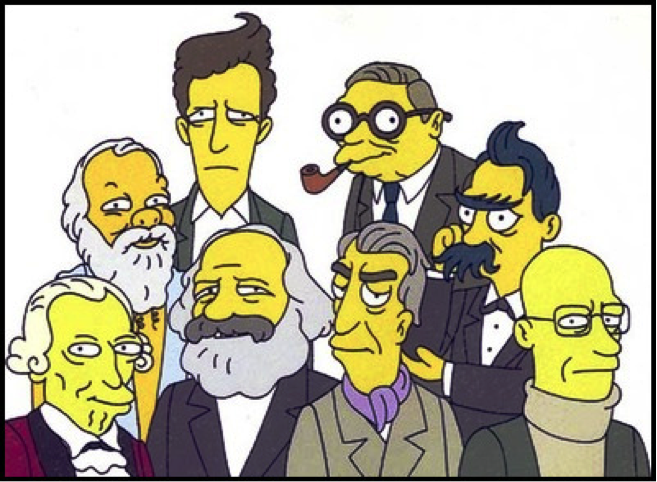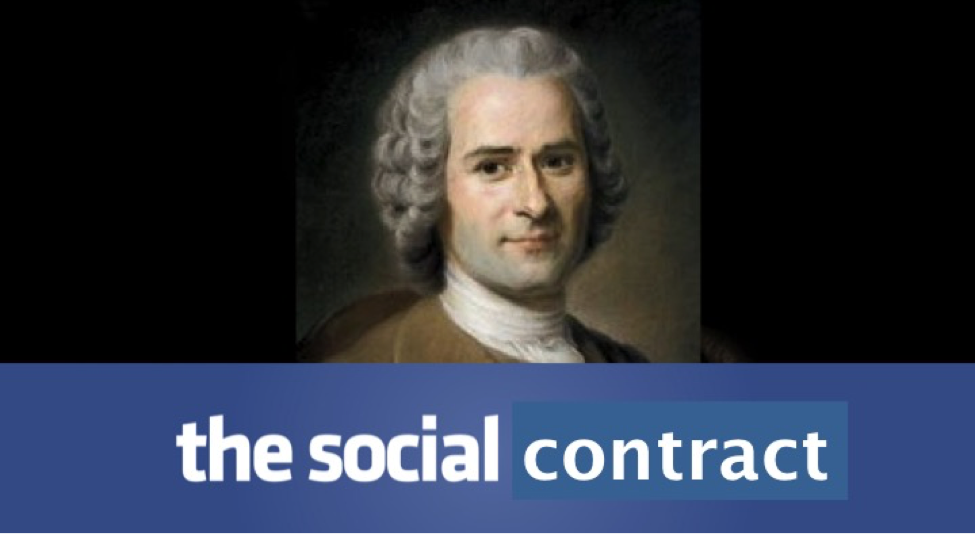Immanuel Kant, Jean-Jacques Rousseau, and Mark Zuckerberg Walk Into a Bar …
A Philosophy Beginner’s Analysis of the Facebook/Cambridge Analytica Scandal
My best friend in high school majored in philosophy in college; I majored in computer science. “It’s pointless to debate philosophy,” I would say, “You can’t deduce one true answer and it’s not going to be applicable in the real world!” She would try to explain things like existentialism and phenomenology to me while the only philosophers I could name were the ones that had mathematical theorems named after them. As I made my way into my master’s program in data science, I found myself suddenly surrounded by moral philosophy. It seems like every day there is a new story about ethical quandaries surrounding the value, privacy, collection, and retention of information.
Facebook has frequently been in the ethical hot seat with its sometimes precarious handling of user data. Most recently, Facebook allowed Cambridge Analytica to collect personally identifiable information of millions of users for the purpose of influencing voter opinions on behalf of politicians paying for their services. (Newcomb, 2018). Cambridge Analytica misrepresented themselves to use Facebook data for nefarious purposes. The ethical question here is: Is Facebook responsible for the outcomes of the apps and services that it provides user data to?
I wonder what the philosophers my friend talked about would have to say about Facebook’s behavior.
 Groening Philosophers
Groening Philosophers
Immanuel Kant believes that categorical imperative is the basis principle to determine whether one’s action is deemed to be ethically correct. He has proposed three versions of this:
1. Something is considered ethically correct if it can be made into universal law.
2. A person should be treated as an end and not the means to achieve an end.
3. Each individual should act as a member of an ideal kingdom where he or she is both the ruler and subject at the same time.
Kant attributes ethical goodness or badness to the action itself, not the outcome of the action. I think in this sense, Kant would find Facebook in the wrong because, even though Facebook didn’t know that Cambridge Analytica was out to do bad things, Facebook knew how much information it was making available to all apps and historically how their users responded to having their privacy invaded. Whether or not apps were exploiting user data (the outcome), Facebook making that available was still unethical. They used their users as a means to an end. Mark Zuckerburg is a Facebook user, but I wonder if he deliberates both as the king of the Facebook kingdom, and as a subject.
 Social Contract
Social Contract
I think Jean-Jaques Rousseau might have a slightly different take on it. He garnered a lot of recognition for his written work on political philosophy,
The Social Contract. Sounds awfully close to
The Social Network, though Rousseau’s wasn’t nominated for multiple Academy Awards. Rosseau believes in a social contract between a governing body and its people and claims that people trade some individual rights for the benefits provided to society as a whole. (Delaney). So, as I think he might see it, Facebook could represent a governing body. Facebook offers its users a global platform to correspond with other users and, if they choose to participate, they give up some of their individual rights to that information in exchange for the access that they wouldn’t otherwise have without Facebook. Even though this might seem to be in Facebook’s favor, Rousseau also believed that laws are binding only when they are supported by the people. Through this lens, Facebook failing to be governed by the wishes of its users breaks the contract. I think Rousseau would agree with Kant even though they would arrive at it in different ways.
Maybe Rousseau and Kant wouldn’t have seen it that way at all. Everyone has a different opinion and problems don’t always fit neatly into the “good” or “bad” box. Socrates (or Plato depending on who you ask) had a much simpler view. He said that there is only one good: knowledge, and one evil: ignorance. (Ambury). I think he would see Facebook’s greatest offense as it was: obliviousness to the potential negative outcomes that were exploited by Cambridge Analytica. Undergraduate-me was right about one thing: there isn’t one true answer. It’s arguable how much culpability Facebook has for the outcomes in the Cambridge Analytica scandal, but many users (and probably philosophers) agree that Facebook acted unethically. Undergraduate-me was wrong too, though. The discussion about these issues is critical and we need to continue to have them to ensure that we hold others accountable for their actions.
Works Cited
Ambury, J. (n.d.). Socrates (469 – 399 B.C.E). Retrieved September 21, 2018, from
https://www.iep.utm.edu/socrates/
Delaney, J. (n.d.). Jean-Jacques Rousseau (1712 – 1778). Retrieved September 21, 2018, from
https://www.iep.utm.edu/rousseau/
Delaney, J. (n.d.). [Jean-Jacques Rousseau]. Retrieved September 20, 2018, from
https://www.iep.utm.edu/rousseau/
Ellerton, P. (n.d.). [Groening Philosophers]. Retrieved September 20, 2018, from
https://pactiss.org/wp-content/uploads/2011/09/SP.jpg
Loaiza, A. (2017, December 20). [The Social Network]. Retrieved September 20, 2018, from
https://theimpactnews.com/columnists/the-new-girl-on-the-block/2017/12/20/reaction-to-the-social-network/
Newcomb, A. (2018, March 24). A timeline of Facebook’s privacy issues — and its responses. Retrieved September 21, 2018, from
https://www.nbcnews.com/tech/social-media/timeline-facebook-s-privacy-issues-its-responses-n859651
 Groening Philosophers
Immanuel Kant believes that categorical imperative is the basis principle to determine whether one’s action is deemed to be ethically correct. He has proposed three versions of this:
1. Something is considered ethically correct if it can be made into universal law.
2. A person should be treated as an end and not the means to achieve an end.
3. Each individual should act as a member of an ideal kingdom where he or she is both the ruler and subject at the same time.
Kant attributes ethical goodness or badness to the action itself, not the outcome of the action. I think in this sense, Kant would find Facebook in the wrong because, even though Facebook didn’t know that Cambridge Analytica was out to do bad things, Facebook knew how much information it was making available to all apps and historically how their users responded to having their privacy invaded. Whether or not apps were exploiting user data (the outcome), Facebook making that available was still unethical. They used their users as a means to an end. Mark Zuckerburg is a Facebook user, but I wonder if he deliberates both as the king of the Facebook kingdom, and as a subject.
Groening Philosophers
Immanuel Kant believes that categorical imperative is the basis principle to determine whether one’s action is deemed to be ethically correct. He has proposed three versions of this:
1. Something is considered ethically correct if it can be made into universal law.
2. A person should be treated as an end and not the means to achieve an end.
3. Each individual should act as a member of an ideal kingdom where he or she is both the ruler and subject at the same time.
Kant attributes ethical goodness or badness to the action itself, not the outcome of the action. I think in this sense, Kant would find Facebook in the wrong because, even though Facebook didn’t know that Cambridge Analytica was out to do bad things, Facebook knew how much information it was making available to all apps and historically how their users responded to having their privacy invaded. Whether or not apps were exploiting user data (the outcome), Facebook making that available was still unethical. They used their users as a means to an end. Mark Zuckerburg is a Facebook user, but I wonder if he deliberates both as the king of the Facebook kingdom, and as a subject.
 Social Contract
I think Jean-Jaques Rousseau might have a slightly different take on it. He garnered a lot of recognition for his written work on political philosophy, The Social Contract. Sounds awfully close to The Social Network, though Rousseau’s wasn’t nominated for multiple Academy Awards. Rosseau believes in a social contract between a governing body and its people and claims that people trade some individual rights for the benefits provided to society as a whole. (Delaney). So, as I think he might see it, Facebook could represent a governing body. Facebook offers its users a global platform to correspond with other users and, if they choose to participate, they give up some of their individual rights to that information in exchange for the access that they wouldn’t otherwise have without Facebook. Even though this might seem to be in Facebook’s favor, Rousseau also believed that laws are binding only when they are supported by the people. Through this lens, Facebook failing to be governed by the wishes of its users breaks the contract. I think Rousseau would agree with Kant even though they would arrive at it in different ways.
Maybe Rousseau and Kant wouldn’t have seen it that way at all. Everyone has a different opinion and problems don’t always fit neatly into the “good” or “bad” box. Socrates (or Plato depending on who you ask) had a much simpler view. He said that there is only one good: knowledge, and one evil: ignorance. (Ambury). I think he would see Facebook’s greatest offense as it was: obliviousness to the potential negative outcomes that were exploited by Cambridge Analytica. Undergraduate-me was right about one thing: there isn’t one true answer. It’s arguable how much culpability Facebook has for the outcomes in the Cambridge Analytica scandal, but many users (and probably philosophers) agree that Facebook acted unethically. Undergraduate-me was wrong too, though. The discussion about these issues is critical and we need to continue to have them to ensure that we hold others accountable for their actions.
Works Cited
Ambury, J. (n.d.). Socrates (469 – 399 B.C.E). Retrieved September 21, 2018, from https://www.iep.utm.edu/socrates/
Delaney, J. (n.d.). Jean-Jacques Rousseau (1712 – 1778). Retrieved September 21, 2018, from https://www.iep.utm.edu/rousseau/
Delaney, J. (n.d.). [Jean-Jacques Rousseau]. Retrieved September 20, 2018, from https://www.iep.utm.edu/rousseau/
Ellerton, P. (n.d.). [Groening Philosophers]. Retrieved September 20, 2018, from https://pactiss.org/wp-content/uploads/2011/09/SP.jpg
Loaiza, A. (2017, December 20). [The Social Network]. Retrieved September 20, 2018, from https://theimpactnews.com/columnists/the-new-girl-on-the-block/2017/12/20/reaction-to-the-social-network/
Newcomb, A. (2018, March 24). A timeline of Facebook’s privacy issues — and its responses. Retrieved September 21, 2018, from https://www.nbcnews.com/tech/social-media/timeline-facebook-s-privacy-issues-its-responses-n859651
Social Contract
I think Jean-Jaques Rousseau might have a slightly different take on it. He garnered a lot of recognition for his written work on political philosophy, The Social Contract. Sounds awfully close to The Social Network, though Rousseau’s wasn’t nominated for multiple Academy Awards. Rosseau believes in a social contract between a governing body and its people and claims that people trade some individual rights for the benefits provided to society as a whole. (Delaney). So, as I think he might see it, Facebook could represent a governing body. Facebook offers its users a global platform to correspond with other users and, if they choose to participate, they give up some of their individual rights to that information in exchange for the access that they wouldn’t otherwise have without Facebook. Even though this might seem to be in Facebook’s favor, Rousseau also believed that laws are binding only when they are supported by the people. Through this lens, Facebook failing to be governed by the wishes of its users breaks the contract. I think Rousseau would agree with Kant even though they would arrive at it in different ways.
Maybe Rousseau and Kant wouldn’t have seen it that way at all. Everyone has a different opinion and problems don’t always fit neatly into the “good” or “bad” box. Socrates (or Plato depending on who you ask) had a much simpler view. He said that there is only one good: knowledge, and one evil: ignorance. (Ambury). I think he would see Facebook’s greatest offense as it was: obliviousness to the potential negative outcomes that were exploited by Cambridge Analytica. Undergraduate-me was right about one thing: there isn’t one true answer. It’s arguable how much culpability Facebook has for the outcomes in the Cambridge Analytica scandal, but many users (and probably philosophers) agree that Facebook acted unethically. Undergraduate-me was wrong too, though. The discussion about these issues is critical and we need to continue to have them to ensure that we hold others accountable for their actions.
Works Cited
Ambury, J. (n.d.). Socrates (469 – 399 B.C.E). Retrieved September 21, 2018, from https://www.iep.utm.edu/socrates/
Delaney, J. (n.d.). Jean-Jacques Rousseau (1712 – 1778). Retrieved September 21, 2018, from https://www.iep.utm.edu/rousseau/
Delaney, J. (n.d.). [Jean-Jacques Rousseau]. Retrieved September 20, 2018, from https://www.iep.utm.edu/rousseau/
Ellerton, P. (n.d.). [Groening Philosophers]. Retrieved September 20, 2018, from https://pactiss.org/wp-content/uploads/2011/09/SP.jpg
Loaiza, A. (2017, December 20). [The Social Network]. Retrieved September 20, 2018, from https://theimpactnews.com/columnists/the-new-girl-on-the-block/2017/12/20/reaction-to-the-social-network/
Newcomb, A. (2018, March 24). A timeline of Facebook’s privacy issues — and its responses. Retrieved September 21, 2018, from https://www.nbcnews.com/tech/social-media/timeline-facebook-s-privacy-issues-its-responses-n859651 